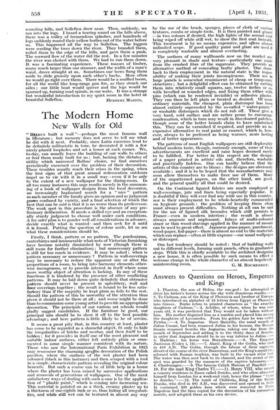Answers to Questions on Heroes, Emperors and Kings
1. Phaeton, the son of Helios, the sun-god : he attempted tc drive his father's horses across the sky with disastrous results.— 2. To Cadmus, son of the King of Phoenicia and brother of Europa. who introduced an alphabet of 18 letters from Egypt or Phoenicia into Greece. Burke refers to printed characters as " the swarthy daughters of Cadmus."-3. Achilles, of whom, when he was nine years old, it was predicted that Troy would not be taken without him. His mother disguised. him as a maiden and placed him among the daughters of Lycomedes. From his golden hair he was called Pyrrha.-4. To Augustus. Since Quintilis, the natal month of Julius Caesar, had been renamed Julius in his honour, the. Roman Senate renamed Sextilis the Augustus, taking one day from the month of September and adding it to the thirty days of Sextilis. in order that Augustus should be in no way inferior to Julius.
5. Hadrian ; his horse was Borysthenes.-6. The Emperor Justinian (Codex i, 14).-7. Marie, King of the Cloths, who died in 410 A.D. The Goths, through the labour of their captives, diverted the course of the river Busentinus, and the King's sepulchre, adorned with Roman trophies, was built in the vacant river bed. The water was then sent back to its channel, and the secret of the spot was guarded by the massacre of the captive labourers 8. Charlemagne.-9. The famous Caliph Haroun al Raschid
10. For the mad King Charles VI-11. Henry VIII, who owned a country residence in Essex called Jericho, and who often absented himself from London for a week-end visit, hence the 'phrase " Gone to Jericho."-12. The tomb of Childeric,„King of the Saban Franks, who died in 481 A.D. was discovered and opened in 1555. It contained 300 golden bees which were removed to Paris. Napoleon had the bees copied for the decoration of his coronation mantle, and adopted them as his own device.








































 Previous page
Previous page